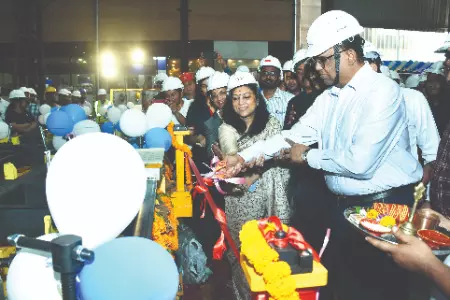TRSL and BHEL launch dedicated production line in Uttarpara

Kolkata: Titagarh Rail Systems Limited (TRSL), in collaboration with Bharat Heavy Electricals Limited (BHEL), has officially inaugurated a dedicated production line for the Vande Bharat Sleeper trains at TRSL’s state-of-the-art facility in Uttarpara, West Bengal, on Friday.
This production line was established by TRSL following a contract awarded by Indian Railways to design and manufacture 80 Vande Bharat Sleeper train sets under a consortium between TRSL and BHEL. Valued at approximately Rs 24,000 crore, the project also includes 35 years of long-term maintenance and stands as one of the prominent initiatives under Prime Minister Narendra Modi's “Make in India” and “Aatmanirbhar Bharat” campaigns.
The inaugural ceremony was attended by key officials from both companies, including Umesh Chowdhary, Vice Chairman and Managing Director of TRSL, and Bani Varma, Director of BHEL. Speaking at the event, Chowdhary expressed his pride in the project, stating, “The Vande Bharat Sleeper project is a shining example of what can be achieved when the public and private sectors come together with a shared vision. This production line reflects our commitment to building future-ready mobility solutions and contributing meaningfully to the vision of a more connected and self-reliant India.”
The Vande Bharat Sleeper variant will be India’s first long-distance, semi-high-speed train, offering a fully indigenous design, enhanced passenger comfort, and cutting-edge safety features. Featuring a modern coach layout, smart onboard systems, and energy-efficient operations, the train aims to transform intercity travel across India.
With production now underway, the first prototype of the Vande Bharat Sleeper is expected to be ready by next year. The Uttarpara facility, equipped with Industry 4.0 technologies and robotic production lines, stands as one of the country’s most advanced railway manufacturing hubs. Notably, it is the only site in India capable of producing both stainless steel and aluminium coaches under one roof. Currently, the facility has an annual capacity of 300 coaches, which is set to expand to 850 to accommodate growing demand.



